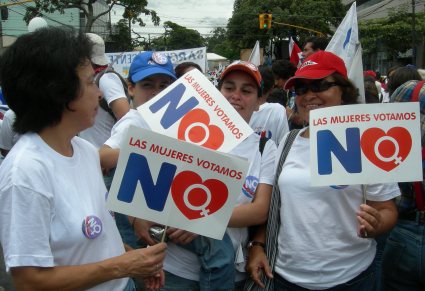FRIDAY, SEPTEMBER 07, 2007
No More CAFTAs Pledge for Trade Justice!

Women protest CAFTA at massive rally in San Jose, Costa Rica, in Sept. 2007. Photo: Kathy Hoyt
The process of negotiating, ratifying, and implementing so-called "free" trade agreements like the DR-CAFTA is out of control, and the time has come to say "enough is enough!" Congress and all elected officials must demand a new approach and should be required to make their positions on trade clear and unambiguous so that people in the United States will know where they stand. With the Pledge for Trade Justice, we are demanding that our public officials start working toward a more just and equitable system. And there is an alternative. Let's press this administration and future ones for just agreements that support sustainable development goals and equity for all.
For reports on the impact of DR-CAFTA during the first months of implementation, click here.
(For background info on each point of the pledge, go here.)
Ask your elected officials and other notable figures to take the Pledge for Trade Justice
Pledge - I will only support trade agreements that include:
1.) Democratic participation, accountability and transparency during trade negotiations;
2.) Provisions that work to protect the dignified lives of small farmers, indigenous communities, women and otherwise vulnerable populations;
3.) Text in the body of the agreements guaranteeing that core labor and environmental standards are strengthened, as defined by international law;
4.) Space for national governments to pursue development strategies that support sustainable, locally-determined economic, social and environmental priorities;
5.) Provisions permitting debt cancellation and aid to be used in direct service to the poor to help close the gaps between and within rich and poor countries;
6.) A framework that focuses finance and investment on productive, long-term development that ensures economic security and sustainable use of resources;
7.) A guarantee that public services like health care, education and potable water will remain public and accessible to poor communities; and
8.) International trade and investment systems that emphasize fundamental human rights, in order to eclipse violence and oppression.
Labels: Archives